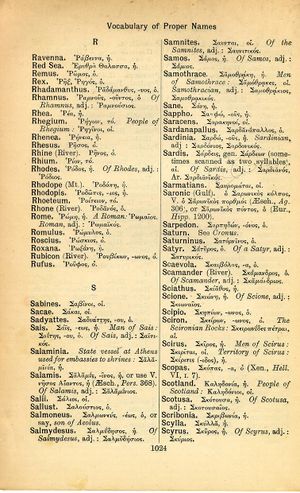Rhamnus: Difference between revisions
ἄνευ γὰρ φίλων οὐδεὶς ἕλοιτ᾽ ἂν ζῆν, ἔχων τὰ λοιπὰ ἀγαθὰ πάντα → without friends no one would choose to live, though he had all other goods
(D_7) |
(Gf-D_7) |
||
| Line 1: | Line 1: | ||
{{WoodhouseENELnames | {{WoodhouseENELnames | ||
|Text=[[File:woodhouse_1024.jpg|thumb|link= | |Text=[[File:woodhouse_1024.jpg|thumb | ||
|link={{filepath:woodhouse_1024.jpg}}]][[Ῥαμνοῦς]], -οῦντος, ὁ. | |||
<b class="b2">Of Rhamnus</b>, adj.: Ῥαμνούσιος. | <b class="b2">Of Rhamnus</b>, adj.: Ῥαμνούσιος. | ||
Revision as of 07:46, 14 August 2017
English > Greek (Woodhouse)
Ῥαμνοῦς, -οῦντος, ὁ.
Of Rhamnus, adj.: Ῥαμνούσιος.
Latin > English (Lewis & Short)
Rhamnūs: untis, f., = Ῥαμνοῦς,>
I the northernmost town of Attica, famed for an ancient temple of Themis, and in later times for a statue of Nemesis, the mod. Ovriokastro, Plin. 4, 7, 11, § 24; 36, 5, 4, § 17; Luc. 5, 233.— Hence,
1 Rhamnūsĭus, a, um, adj., Rhamnusian Rhamnusium se aiebat esse, from Rhamnus, Ter. And. 5, 4, 27: Antiphon, Cic. Brut. 12, 47: virgo, i. e. Nemesis, Cat. 66, 71; also called dea, Claud. B. Get. 631; and simply Rhamnūsia, ae, f., Ov. M. 3, 406; id. Tr. 5, 8, 9; Stat S. 3, 5, 5. —
2 Rhamnūsis, ĭdis, f., the Rhamnusian goddess, i. e. Nemesis, Ov. M. 14, 694.
Latin > French (Gaffiot 2016)
Rhamnūs, ūntis, m. (Ῥαμνοῦς), Rhamnonte
1 bourg de l’Attique, célèbre par le culte de Némésis : Plin. 4, 24
2 port de Crète : Plin. 4, 59.

